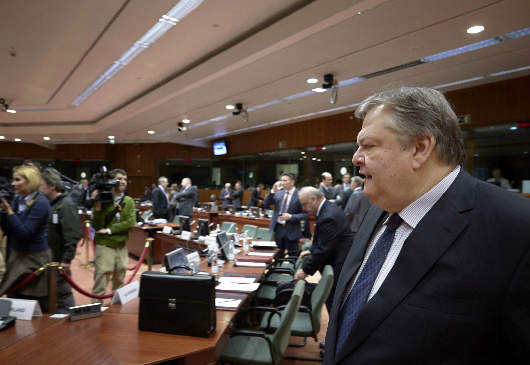 Deputy Prime Minister and Foreign Minister Evangelos Venizelos participated in the EU Foreign Affairs Council (FAC) that convened in Brussels today, Monday, 16 December 2013.
Deputy Prime Minister and Foreign Minister Evangelos Venizelos participated in the EU Foreign Affairs Council (FAC) that convened in Brussels today, Monday, 16 December 2013.
The FAC’s morning session focused on the coming steps in the agreement reached in Geneva on Iran’s nuclear programme, and on the situation in Syria, in Lebanon, and in the Middle East, in combination with the peace process.
In his intervention, Mr. Venizelos referred in particular to the situation prevailing in Lebanon – which is suffering dramatic repercussions from the war and humanitarian crisis in Syria – asking that the European Union prepare a more specific and practical strategy that will help towards the facilitation and completion of the processes for determining the new government of Lebanon, and underscoring that without the existence of a government, the stability of the country and the region cannot be ensured.
There was then a discussion of the Eastern Partnership, based on the results of the Vilnius Summit Meeting and subsequent developments, with a focus on the recent developments in Ukraine.
During the luncheon, there was a meeting of the EU Foreign Ministers with Russian Foreign Minister Sergey Lavrov. The meeting covered all the issues of European and bilateral interest, from combating terrorism and managing migration flows to protection of human rights, and from visa liberalization to energy issues, based on the European Commission’s recent announcements regarding the planned South Stream pipeline. A large portion of the discussion dealt with the Ukraine issue and the future of the Partnership, in combination with other agreements the EU has concluded with other countries.
In his intervention during the luncheon, Mr. Venizelos referred to the major issue being faced by Ukraine in covering its funding needs, stressing that the issue relates not only to Russia or the European Union, but also to the probable role of the IMF. Consequently, the need to cover the country’s funding needs may have very serious international political and economic repercussions.
He also referred to the need to intensify EU-Russian cooperation even further in confronting the humanitarian aspect of the Syrian crisis, with the specific example of protecting the Christian populations, monuments, foundations and institutions.
During its afternoon session, the FAC looked at Western Balkan issues. In his intervention, and ahead of Greece’s assuming the Presidency of the Council of the EU, Mr. Venizelos stressed the importance of the opening of accession negotiations with Serbia, given that such a development might facilitate and accelerate the Belgrade-Pristina talks and ensure the European perspective of Serbia and Kosovo.
Mr. Venizelos reiterated that Albania’s European perspective constitutes a strategic choice for Greece, within the framework of the partnership between the two countries, which he had the opportunity to present during his recent trip to Tirana.
Finally, referring to the issue of the Former Yugoslav Republic of Macedonia, Mr. Venizelos presented the Greek positions in the spirit of the presentation he made recently at the Meeting of NATO Foreign Ministers. The FYROM issue will be discussed in greater detail at the EU General Affairs Council (Brussels, 17 December 2013), at which Deputy Prime Minister and Foreign Minister Venizelos will represent Greece.
December 16, 2013


